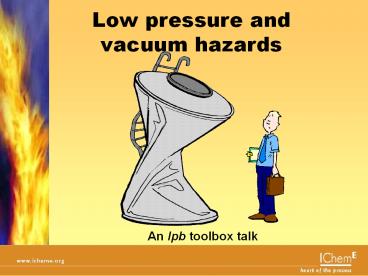Low pressure and vacuum hazards - PowerPoint PPT Presentation
Title:
Low pressure and vacuum hazards
Description:
Low pressure and vacuum hazards An lpb toolbox talk Pressure and Force Let s review a few basic principles: Force = Pressure x Area this is like many small weights ... – PowerPoint PPT presentation
Number of Views:393
Avg rating:3.0/5.0
Title: Low pressure and vacuum hazards
1
Low pressure and vacuum hazards
An lpb toolbox talk
2
Pressure and Force
- Lets review a few basic principles
- Force Pressure x Area
- this is like many small weights sitting on an area
- the larger the area, the greater the force
- the weights may be small, but if the area is
large, they will add up to a big force!
3
Example
If Force Pressure x Area
then, 10psi pressure on a 12x12 square surface
area will be 1,440 pounds of force.
this is equivalent to an object that weighs
1,440 lbs!
4
Can you get hurt with low pressure?
- ABSOLUTELY!!!
.and be especially careful with large surfaces
like manways. 1 psi may not even register on the
gauge but its enough to send a hatch flying if
all the bolts are removed and the gasket is stuck.
5
Low pressure hazard
- This door had 2.8 psi behind it, the equivalent
of 1915 lbs of force. - The door only weighs 15 lbs.
- So when it came loose, it slammed open seriously
injuring a worker.
6
Over-pressured tank
- This tank was fitted with
- a high level alarm, which was accepted, and then
forgotten - a pressure control system, which was out of
service - a pressure relief valve with a flame arrestor
which was found to be blocked - .so when the product was transferred into the
tank, it overpressured until the roof ruptured,
even though the pressure was only a few psi over
hydrostatic
7
Vacuum hazards
- When the pressure inside the vessel is lower than
atmospheric pressure, the force acts inwards,
with sometimes spectacular results.
8
What happened?
- The tanker was being steam cleaned and, at the
end of the job, the hatches were closed. - With no vacuum breaker fitted, as the steam
condensed, the tanker imploded..
9
Another tanker problem
- This tanker was being pumped out. The hatches
were all closed and the vacuum breaker failed to
operate. - The problem is not confined to rail tankers
though
10
Covered vent
- A tank was being painted and the painters had
covered the vent with plastic sheeting. - When operations started to empty the tank, it
collapsed before the plastic sucked through
11
Could this happen on your site?
12
How might this happenon your site?
- 1 psi on a 24 diameter hatch exerts a force of
450 pounds. - A few bolts left loosely in place will limit the
distance the hatch can move. - Steam condenses to about 1/1700th of its volume
as it cools. - It sometimes takes a vacuum of only a few inches
of water to collapse a tank. - Be aware of blockages and trapped pressure.
13
Further reading
Hazards of trapped pressure and vacuum, BP
Process Safety Series, ISBN 0 85295 475 1,
published 2005, available from www.icheme.org/shop
, price 27.00
See also In brief corrosion from LPB163,
February 2002
14
Disclaimer
Whilst the Institution of Chemical Engineers has
made every effort to ensure the accuracy of the
information contained in this training
presentation it remains the responsibility of
those responsible for the operations to ensure
that the regulations and guidance issued by the
authorities are consulted, that an appropriate
risk assessment is carried out and that
appropriate procedures are stipulated and
followed.































